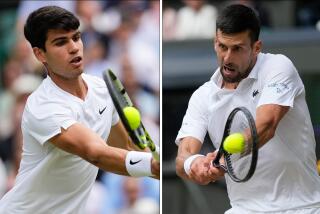WIMBLEDON / WOMEN : U.S. Pair Closing In on History
- Share via
WIMBLEDON, England — They grew up together in Houston, played together at little MacGregor Park and now are moving up together at Wimbledon. Along the way, Americans Lori McNeil and Zina Garrison-Jackson also are on the verge of doing something else.
Making history together.
Both women have reached the women’s singles round of 16, with Garrison-Jackson advancing to the fourth round Saturday with a 6-2, 4-1 victory against Italy’s Laura Golarsa, who was forced to retire because of an injured shoulder. A day earlier, McNeil beat Kristie Boogert of the Netherlands.
With their victories, McNeil, who earlier upset No. 1-ranked Steffi Graf, and Garrison-Jackson are one match away from becoming the first two African-American women to both reach the Wimbledon quarterfinals.
Together with American Bryan Shelton, the qualifier who stunned second-seeded Michael Stich of Germany in the opening round, the three players have attracted the kind of attention not often paid to African-American touring pros. Like it or not, they have become centerpieces for minorities in tennis.
“I think it’s long overdue,” said Garrison-Jackson of the renewed interest. “And if it will help other people, I don’t mind. I think something needs to happen in tennis, because we’re not getting the players’ interest. This might help.”
It can’t hurt, especially when Sports Illustrated is using its magazine cover to ask, ‘Is Tennis Dying?’
Garrison-Jackson oversees a tennis program in Houston that is in desperate need of a major sponsor. At last check, 484 young players, many of them minorities, were enrolled in the innovative program. Another 200 are on the waiting list.
Garrison-Jackson, as well as other players, do what they can, but it would help if corporate America sent a check. Or better yet, suggested Garrison-Jackson, if the U.S. Tennis Assn. became more involved.
USTA officials say they are involved. They point to a variety of inner-city tennis programs that are beginning to pay dividends.
At the core of the problem is the general failure of tennis to attract minorities into the mainstream. All too often, McNeil said, tennis becomes the fourth or fifth choice behind other sports.
“I’m not exactly sure how you would improve it,” she said. “I think my exposure (and) minorities being exposed to tennis is very important. They have to see it. It has to be available to them and I think (this week’s victories by McNeil, Garrison-Jackson and Shelton) are a start. Beyond that, I’m not so sure. I think Bryan’s a great role model and I think when any of us do well, it’s pretty inspiring--I think for the Americans, as well as minorities.
“But I think it’s just making tennis available and exposing them at an earlier age, especially boys, because I guess they have a lot of other sports. Basketball and football seem to be pretty big. . . . Shaquille O’Neal and Michael Jordan. Everyone wants to be Michael Jordan.”
By next Sunday, more kids might want to be like McNeil or Garrison-Jackson.
McNeil will play unseeded Florencia Labat of Argentina in Monday’s round of 16. A victory there would leave McNeil, who has reached the quarterfinals only once in 10 previous Wimbledon visits, with a match against either No. 14 Amanda Coetzer of South Africa or Larisa Neiland of Latvia.
Garrison-Jackson, who reached the final here in 1990, plays in the lower half of the draw and will meet a much tougher fourth round opponent--No. 2 Arantxa Sanchez Vicario of Spain. Sanchez Vicario hasn’t been extended to a third set and has lost only nine of 45 games.
As for the remainder of the draw, almost all attention is focused on No. 4 Martina Navratilova, whose serve-and-volley game make her the logical, if not sentimental, favorite to win a 10th Wimbledon singles title.
Navratilova needed only 59 minutes on Centre Court Saturday to defeat Linda Harvey-Wild, 6-3, 6-2. Next for the 37-year-old Navratilova: No. 17 Helena Sukova of the Czech Republic--formerly Czechoslovakia, Navratilova’s native country.
“There’s a big link there,” Navratilova said. “There’s a lot of baggage happening when I play her. That’s another tricky one. I’ll have to keep playing the ball and not get into the past, because it’s easy to get overwhelmed by it.”
No. 9 Lindsay Davenport, who recently graduated from Murrieta Valley High in Riverside County, has a different sort of problem: not to get overwhelmed by the thought of facing the more experienced Gabriela Sabatini of Argentina, who is seeded 10th.
Sabatini nearly won the singles championship in 1991. With Graf gone, Sabatini has as good as chance as anyone this time around.
More to Read
Go beyond the scoreboard
Get the latest on L.A.'s teams in the daily Sports Report newsletter.
You may occasionally receive promotional content from the Los Angeles Times.










